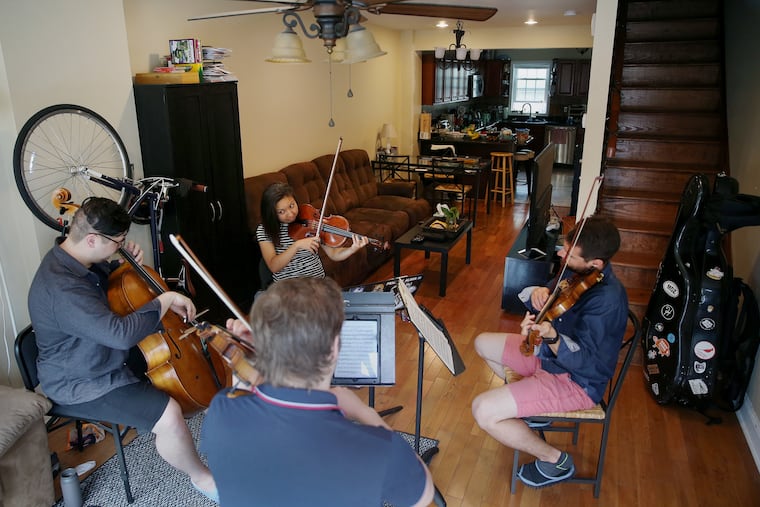When a pandemic stopped the world and an uprising brought it roaring back, these Philly musicians played on | Helen Ubiñas
Music composed by Beethoven in 1825 offers some hope in the time of coronavirus.

This might be an odd request, but humor me.
When you have about a half-hour or so, take a listen to Beethoven’s String Quartet No. 12 in E flat major (Op. 127).
Nobody panic. I am not the new classical music critic. (Lucky us!) But I do have a newfound appreciation for the composition, thanks to a group of quarantining musicians.
The friends have been locked down together in South Philadelphia since the pandemic put a stop to live music — and they are now playing in their living room.
Justin Goldsmith, 29, is a cellist with the Vera Quartet, which just wrapped up a residency at the Curtis Institute of Music.
James Wilson, 30, is a freelance violinist.
Joel Link, 31, is also a violinist and is a founding member of the Dover Quartet, formed at Curtis.
And Zoë Martin-Doike, 30, is a viola player with the Metropolitan Opera Orchestra.
The guys are roommates, but when everything shut down, Martin-Doike decided to leave New York and join her boyfriend, Link, in Philly. This is the most time the couple, who are usually working and traveling, have been able to spend together in the five years they’ve been dating.
Love in the time of coronavirus can be romantic, no?
Wait, it gets more adorable. Inside the four-bedroom home, the quartet has more than made the best of quarantine. There were homemade pickles and hummus and kombucha and sauerkraut, and epic paella. There were also some tequila shots to toast news of Martin-Doike’s tenure with the orchestra delivered through a timely socially distant text. And talks about what the world might look like post COVID-19: Virtual concerts were great, Link said, but he hoped there was “renewed appreciation for something we always thought would be there.”
Even when there were a few issues — whose turn was it to clean up, anyway? — the musicians found a way to stay in sync, thanks mostly to Martin-Doike’s resident assistant chops honed at Curtis.
But mostly there’s been a home full of music, including daily playing in the living-room-turned-practice room. For a couple of hours every day, the quarantined quartet would meet to practice Beethoven’s piece and Mendelssohn’s String Quartet No. 5 in E flat major (Op. 44, No. 3).
Sometimes a passerby would pause at the window. The friends also delivered a virtual birthday concert for a family friend’s mother.
If they couldn’t control the state of the world, Wilson said, they could at least concentrate on what they could control: making music.
While pondering their choices, Martin-Doike pointed to the warmth and triumphant characters in E flat major, known as “the heroic key.”
“I think it’s maybe subconsciously a bit of trying to see positivity and trying to see hope for the future,” she said.
Goldsmith agreed. “Both are uplifting,” he said, “but the Beethoven in particular goes to some darker places before fighting its way out of them.” (Fingers crossed, 2020′s soundtrack.)
Anyway, I looked forward to sharing a little bright spot with readers suffering through the lockdown. And then overnight, it seemed, the whole world changed — again.
A nation that was already dealing with a historic pandemic was suddenly reckoning with a righteous uprising over police accountability and racial inequality.
I thought of the group as I was forced to shelve their story for a bit, and wondered if they were among the throngs of demonstrators on the streets.
Turns out they were, as I learned when I was finally able to reconnect with Goldsmith after three weeks that felt more like three years. The group was still using the Philly home as home base. But Goldsmith, who will be a community artist fellow at Curtis next year, has ventured to his parents’ home in Westchester County, N.Y. Martin-Doike and Link are heading to a COVID-safe music festival in Colorado, and Wilson is busy practicing for orchestra auditions. Goldsmith and I talked a little about the music they’d been practicing, which they are hoping to release at some point, and how everyone was faring this deep into a pandemic that showed no signs of slowing while people were still taking to the streets.
Some days, Goldsmith said, echoing how so many of us feel, it feels like the push against righting so many of the nation’s inequities “is so strong it’s like nothing will ever happen, and that can be really discouraging.”
Other days, “I feel like we are moving in the right direction, and these inequities that have existed forever and have been a part of the fabric of everyday life and gone unnoticed might finally have a chance of being addressed.”
Do you hear the music? From the darkness comes light.